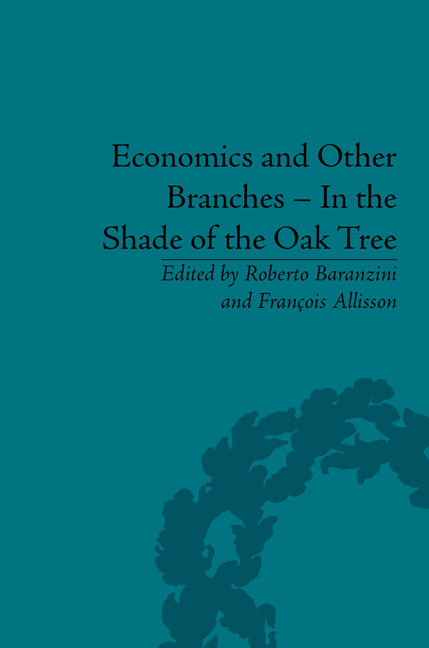Book contents
- Frontmatter
- CONTENTS
- List of Contributors
- List of Figures and Tables
- Introduction
- Pascal Bridel's Bibliography (up to 2013)
- Part I Léon Walras's Economic Thought
- Part II The Spreading of Thought
- Léon Walras's Reception
- The Lausanne School
- French Matters
- Cambridge UK
- Part III Monetary Theory
- Part IV Methodology
- Part V Economics and Humanities
- Economics and Social Sciences
- Some Insights from Visual Arts
- Part VI Economics and Civil Society
- 28 A Reflection on the Social Utility of Modern Macroeconomics
- 29 Failing to Control: Accountability in Historical Perspective
- 30 Does Transparency Engender the Confidence of the Governed? A Contribution to Political Thought
- 31 Face to the Environmental Challenge: Straddling the Fence between Social Responsibility and Penal Responsibility
- 32 Law as a System of Normative Production: Law and Semiotics
- Notes
- Index
32 - Law as a System of Normative Production: Law and Semiotics
from Part VI - Economics and Civil Society
- Frontmatter
- CONTENTS
- List of Contributors
- List of Figures and Tables
- Introduction
- Pascal Bridel's Bibliography (up to 2013)
- Part I Léon Walras's Economic Thought
- Part II The Spreading of Thought
- Léon Walras's Reception
- The Lausanne School
- French Matters
- Cambridge UK
- Part III Monetary Theory
- Part IV Methodology
- Part V Economics and Humanities
- Economics and Social Sciences
- Some Insights from Visual Arts
- Part VI Economics and Civil Society
- 28 A Reflection on the Social Utility of Modern Macroeconomics
- 29 Failing to Control: Accountability in Historical Perspective
- 30 Does Transparency Engender the Confidence of the Governed? A Contribution to Political Thought
- 31 Face to the Environmental Challenge: Straddling the Fence between Social Responsibility and Penal Responsibility
- 32 Law as a System of Normative Production: Law and Semiotics
- Notes
- Index
Summary
The Law as Objectivation of the Form and Substance of Power
There is in a certain way a vulgate of legal theory in which the legal system is defined as a set of norms. I say Vulgate: a theory circulating widely enough to be considered the official theory, which is composed in a fairly undifferentiated way of a few doctrines put together (mainly Kelsenian and post-Kelsenian normativism, realistic theories and logical formalization approaches).
Thus, the definition of the law immediately refers to that of the norms, as they are its constitutive components. According to the Vulgate, these are requirements, or behavioural models – accompanied, should they be breached, with the threat of sanctions. This definition raises a problem, which is primarily theoretical: what is the distinguishing criterion of the legal norm, given that there are other prescriptive systems? (I just said ‘theoretical’, which is not, or not immediately pejorative: I'll wax theoretical myself, while nevertheless incorporating the practice of law into the theory by showing that work done on the norms is as important as the norms themselves.)
The classic illustration of this distinguishing criterion issue is provided by the well-known comparison of two situations: the first is that of a bandit extorting his victims of their jewellery, the second that of a bailiff seizing goods from a recalcitrant debtor.
- Type
- Chapter
- Information
- Economics and Other Branches – In the Shade of the Oak TreeEssays in Honour of Pascal Bridel, pp. 449 - 460Publisher: Pickering & ChattoFirst published in: 2014



